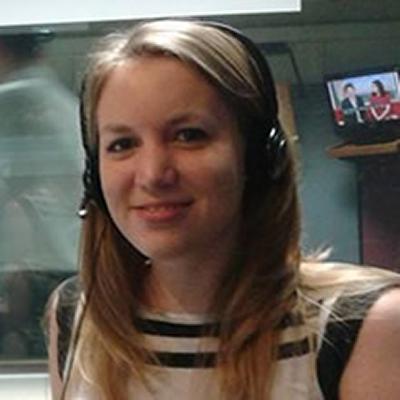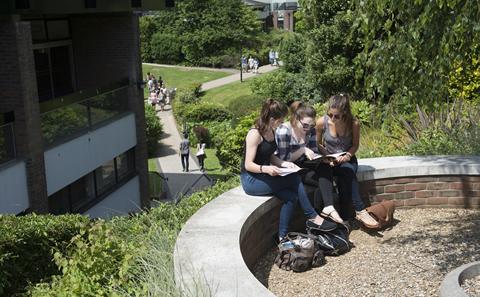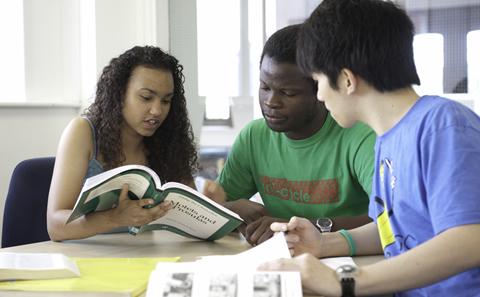Faye Hackwell Philosophy, 2007
Broadcast journalist at the BBC

The deciding factor for me was being invited for an interview with the Philosophy department – something no other universities I applied to did. I felt I got to know a lot more about the university than I would have done on a typical open day and that the department was interested in me and what I had to offer. The course offered a variety of modules and I was also impressed by the quality of the student accommodation and what Southampton had to offer as a city.
The course offered a variety of modules and I was also impressed by the quality of the student accommodation and what Southampton had to offer as a city.
How did Southampton help you settle in once you started?
From the moment I arrived in my halls of residence (Hartley Grove), I was met by a member of the student committee for the halls and made to feel welcome. There were such a wide variety of events on in Freshers’ Week and the whole atmosphere was extremely warm and friendly. I must have met hundreds of people in that first week, many of whom I am still in touch with today. The staff in the Philosophy department were also approachable and caring, I was assigned a personal tutor who met me to discuss how I was settling in and was there to help with any welfare, as well as educational, needs.
What were your Southampton ‘highlights’ whilst you were studying here?
Finding out I had gained a 2:1 BA Hons in Philosophy was an incredibly proud moment. I was also involved with lots of extra-curricular activities – as a member of the rowing team, representing the university on the water was very rewarding and also seeing my name in print alongside a story for the first time in the student newspaper was a great highlight – and turned out to be the start of a career in the media, with many more by-lines to come.
What opportunities did you take up (within your degree programme and extra-curricular)? In what ways did they help your personal development?
I was part of the Junior Common Room (student committee) for my former halls of residence when I was in my second year, which involved organising events for the freshers in the year below me. I helped to organise a ball, which gave me good experience in event coordination, which I could take forward into other jobs. I was also on the rowing team, which helped me to develop my teamwork skills and reignited a passion in me for sport – I no longer row, but do run marathons, so I have kept up the fitness I built up through rowing. I also took on a role as student writer for the university’s careers guide, which involved interviewing students and writing profiles and features for the guide. It really helped having this on my CV when I went on to apply for journalism jobs, as I could show examples of work I’d had published.
Did you have the opportunity to study modules outside of your core subject area, and how have they added to your success after leaving the University?
Yes, in my second year I took a module in film studies. It was one of the best modules I did and good to have an insight into a different subject. I learnt about cinematography techniques and how to critique films, which has been useful in my job in the media. Some of my friends did languages as modules outside their own courses, which really helped them to get an introduction into the language. There were lots of opportunities like this and they were well promoted.
Did you participate in any extra-curricular activities that provided skills that you have used after leaving?
Yes, I was a regular writer for the student newspaper, The Wessex Scene, and I used cuttings from this to take to interviews until I had built up a portfolio of professional work to take. This also helped me to improve my writing style, learn about how newspapers are put together and develop my interview skills.
Did any exposure to employer involvement or research led learning during your course help you achieve your ambition? If so, how?
Philosophy developed my creative thinking skills – something I use every day at work to come up with ideas for radio features. It taught me to think outside the box and take a look at things in a different way, which often leads to the most effective and eye-catching ideas for creative production content.
What did you enjoy most about your course?
The lecturers were engaging and sparked a genuine interest in the subject in their students. I liked how we took a lot of responsibility for our own learning and rather than have lots of seminars and tutorials like some other courses, most of it involved attending lectures and developing your own ideas and theories under the guidance of a tutor, rather than being directed to do lots of smaller pieces of work.
What networking, employment and work experience opportunities did you undertake and did they enhance your Southampton experience?
I did work experience with the Southern Daily Echo newspaper while I was at university and, as well as making me realise journalism was the career for me, it also helped me to get onto a postgraduate course in journalism at Cardiff University. I also did quite a lot of voluntary work while at Southampton, mainly at sports events (such as the 2006 World Rowing Championships and a year volunteering a day a week at Hampshire Cricket Club in their grassroots development team). This really enhanced my CV and made me feel I was making the most of my time there as I was giving something back.
What is Southampton like as a place to study?
Southampton is the perfect student city – great nightlife, good shops and lots of events and activities going on. The presence of the students really adds to the city’s vibrant atmosphere and there is an abundance of good quality, affordable student accommodation on offer. The university has excellent sports facilities, which are very reasonable to use. I loved Southampton and would definitely consider living there again if my career takes me to the area.
What have been the highlights of your career to date?
Getting my first job at the BBC was a very proud moment, as I had wanted to work for the organisation since I was a child and felt I had worked hard as a journalist to prove I was deserving of the opportunity. Some of the most memorable moments of my career have come as a regional newspaper reporter – notably covering the Dale Farm travellers eviction in Essex, where I was in the thick of the action reporting on violence between human rights protestors and riot police. I have also got to interview some of my celebrity heroes from the worlds of sport and showbiz. The main highlight though is going into work every day, not knowing what I’m going to be covering that day, but knowing whatever it is will be engaging and interesting, because my job is to find stories and guests who meet that description. Being a journalist has never felt like work and I genuinely feel like I’m being paid to do what I love doing.
What advice would you give to a student starting their degree at Southampton?
Make the most of every opportunity on offer. It’s unlikely you’ll have the chance to do things as varied as extreme ironing, cheerleading, cocktail critiquing and debating politics in the same place in the future. Live every day to the full, enjoy your course and work hard, but ensure you also make the most of the hours outside the library and lecture hall. I’d definitely advise joining at least one society or team, not just for the social side but also for the skills it will help you develop. One of the best decisions I made at Southampton was joining the rowing team – I got to represent the university at races across the country, improved my fitness and wellbeing, had some fantastic nights out (especially the regular Isle of Wight bar crawls!) and made some great friends I am still in touch with today.
If you had your time at University again is there anything you’d do differently?
I would get more involved in university activities earlier on. I didn’t join any societies or committees until my second year and I feel I perhaps wasted a year of opportunities to try new things when there was so much on offer. But I did enjoy my first year, did well academically and met lots of fantastic people, so it was definitely still a year well spent.
What tips would you give to current students looking to start a career in your sector? What could they be doing now to make themselves more employable when they graduate?
The media is notoriously difficult to get into and there is a very competitive jobs market. You need to be prepared to start at the bottom, on quite low pay for a graduate job, and work hard to work your way up. My first job was on a local newspaper in the South Wales Valleys, in an office on my own, without even a toilet, but I engaged in the local community, found exclusive news stories and worked unsociable hours to cover local events and my career progressed from there. I would advise getting as much media experience as you can while at university, as you will be expected to take evidence of this to job interviews. Write for the student newspaper, work at the student radio station, write a blog, use social media and also get experience in professional outlets outside of university. I got work experience with The Sunday Times Sport and BBC Sport at Wimbledon while I was at university, all through asking for opportunities, and that gave me some great contacts and inspiration.


